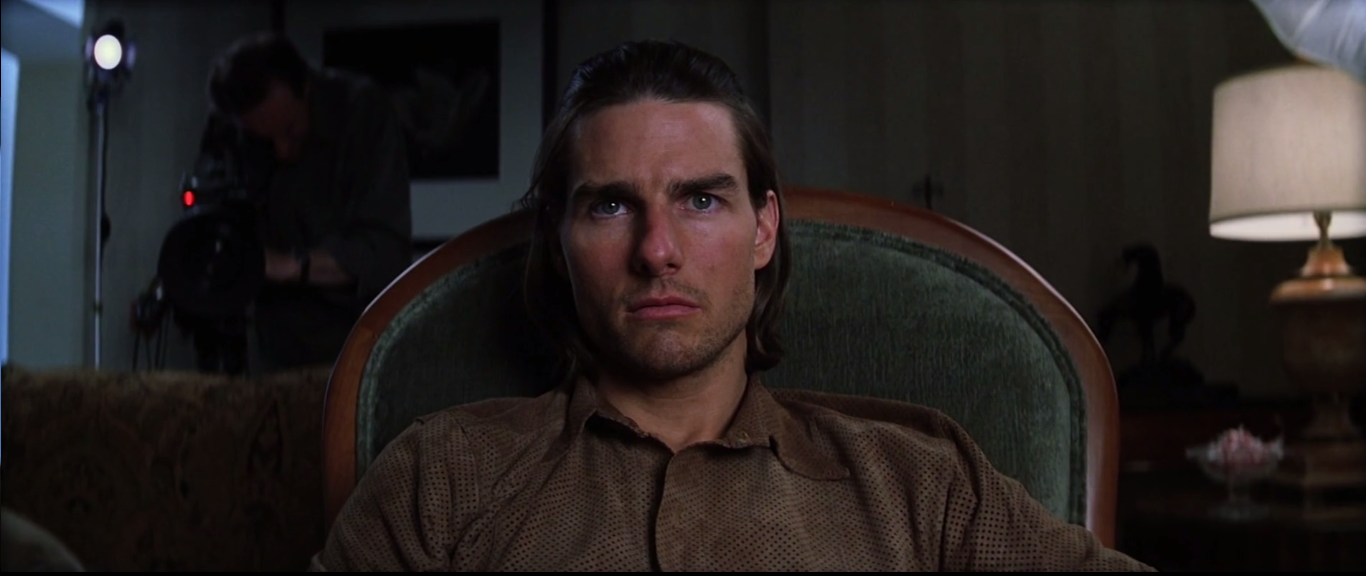|
By Camden Ferrell 20 years since its release, Paul Thomas Anderson’s masterpiece Magnolia remains a remarkably affecting and ambitious piece of modern cinema. It is a film of intricately woven narratives that follows several characters as they search for meaning over the course of one fateful day. This is a film that has stood the test of time, and it is one that warrants and rewards those who choose to re-watch and dissect all of its beauty. Paul Thomas Anderson begins his film with one of the most original and expertly crafted opening sequences in film history. A narrator details three instances of unfathomable coincidence that set the stage for the film that unfolds thereafter. The narrator says these events are not just “something that happens”, and it segues into the start of the film by declaring that these strange occurrences happen all the time. Then, we are introduced to the large cast of characters in a genius and intricately assembled montage set to the melodic tunes of Aimee Mann. What’s impressive is how well developed, balanced, and interconnected each character is in this film. One of the main standouts of this film is Frank T. J. Mackey (Tom Cruise), a womanizing and sexist pickup artist. He is one of the most complex characters in this film, and he’s one that deserves a lot of attention. His introduction on the stage is to the larger than life sounds of Also Sprach Zarathustra. This captures the delusion of grandeur of his personality as well as the idolization he receives from his fervent fanbase. He is a hard character to really approach as a viewer due to his vulgar and provocative nature, but as we learn more about the character, he becomes more palatable. He’s a man who became successful by teaching other men how to claim and assert their dominance. However, we soon infer from a candid interview that this may be a result of the trauma and neglect he suffered as a kid at the hands of his father, Earl Partridge (Jason Robards). This brings us to Earl’s own network of characters. We meet him as he nears death at the hands of his caregiver, Phil Parma (Phillip Seymour Hoffman). It’s interesting to experience death through the lens of a dying man, and it’s one of the more existentially thought-provoking parts of the movie. He is in anguish, both physical and spiritual due to the transgressions he has committed in his life. This is also seen in the mentality and behavior of his wife, Linda (Julianne Moore). She too is overcome with the guilt of her actions that closely parallel her dying husband. Earl is the head of a studio that produces the hit game show What Do Kids Know? This long-running show featured Donnie Smith (William H. Macy) when he was a kid. As an adult, it’s almost heartbreaking to see his regressive schoolboy crush that he has on a brace-faced bartender. He’s emotionally stunted and even tries to get braces in an attempt to find love. In the present day, Stanley (Jeremy Blackman) is a kid-genius who is competing on the same show. He is son to a self-absorbed father who uses his son’s celebrity to try and galvanize his acting career. It’s hard to watch his scenes as the love from his father is something to be earned not expected. The host of this game show is T.V. personality Jimmy Gator (Phillip Baker Hall). He is a terminally ill man who drinks to cope with his job, his regrets, and his troubled family life. Claudia (Melora Walters) is his drug-addicted daughter that can’t find it in herself to forgive him. We see her as she spirals through her life of recklessness all while looking for love with a well-meaning police officer (John C. Reilly).
This is a beautifully intertwined film that doesn’t waste a single second of screen time. It features naturally flowing cinematography and structure that enhance the viewing experience. It’s a risky film that crosses the three-hour mark that also contains a 9-way sing along and an unexpected twist so bizarre yet so powerful in context of the film. It’s a film about the past and what it means for your present. More than once, the film utters the line “We may be through with the past, but the past is not through with us”. It’s a simple yet highly effective line that captures the nature of this movie perfectly. This movie features a lot of strained familial relationships in a way that is so profound yet deeply upsetting. Frank reluctantly comes to his father’s deathbed for a moment of catharsis that is so powerful due to Cruise’s raw emotion in the scene. Despite the neglect, Frank still can’t keep himself away from the source of all of his shortcomings in adulthood. Elsewhere, Claudia refuses to speak with her father due to her supposed molestation. It’s an emotional look at how abuse carries on into adulthood, and it’s a storyline that this film refuses to give any closure. It’s also incredibly upsetting to see how Stanley’s dad clearly didn’t care his son was missing all night. His geese had stopped laying eggs, so why should he care? Things often happen in pairs in this film. Two characters have cancer. Two are/were quiz kids. Two use drugs to cope with their problems. Two are simultaneously humiliated on television, and many lines are said twice throughout the film. Do these pairs offer the hope of empathy, or does it just reinforce its tragedy? Or can you chalk up these pairs to just being one of those “strange things” mentioned in the beginning? Magnolia stands strong after 20 years, and it remains Paul Thomas Anderson’s most accomplished film to date. It features masterful acting, profound writing and intent, and an enthralling execution seen seldom to never in cinema. This is a captivating film from start to finish, and it is a masterpiece worth checking out on its 20th anniversary.
1 Comment
mcsteve
4/23/2024 01:02:54 am
This is so well-written! I also clearly need a rewatch because I missed some things that you point out like I noticed lines were being repeated but didn’t realize things were happening in pairs. Masterpiece from start to finish.
Reply
Leave a Reply. |
The Snake HoleRetrospectives, opinion pieces, awards commentary, personal essays, and any other type of article that isn't a traditional review or interview. Archives
June 2024
Categories
All
|
|
|
disappointment media
Dedicated to unique and diverse perspectives on cinema! |


